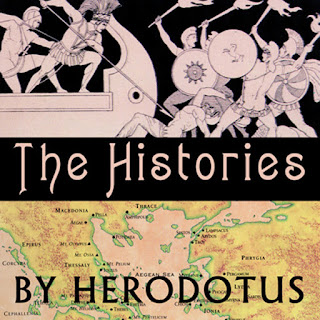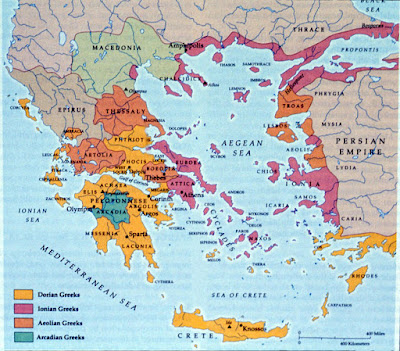Book I (Clio)
“Herodotus of Halicarnassus here presents his research so that human events do not fade with time. May the great and wonderful deeds — some brought forth by the Hellenes, others by the barbarians — not go unsung; as well as the causes that led them to make war on each other.”
Immediately Herodotus establishes who he is, that he is conducting an inquiry into events, and that he is an unbiased observer, treating both the Hellenes and barbarians alike, lauding each of their deeds.
He goes on to deal with the cause of the enmity between them: according to the Persians, those dratted Phoenicians started it all. They sailed to Argos and kidnapped some women, Io, the daughter of the king being one of them, and that is how she arrived in Egypt. This version is vastly different than the Io version told by Ovid in his Metamorphoses. In retaliation, the Hellenes then kidnapped the king’s daughter, Europa, from the Phoenician city of Tyre, again a different version from Ovid’s recounting of Europa’s kidnapping. Yet not being satisfied with one kidnapping, the Hellenes set out again, this time absconding with the king of Colchis’ daughter, Medea. Now, when Paris, the son of Priam, heard about these kidnappings, he thought nothing of stealing Helen. Even though the Hellenes were seen as the aggressors who began the hostilities, the Persians thought it plain silly to be so concerned about these women, as they would not have been kidnapped unless they were willing. Well, okay ….. But to add another twist, the Phoenicians disagree with the Persians, saying that Io had relations with the captain of the Phoenician ship and had to sail away to hide her pregnancy. Heredotus will not say either way who was right, but he does know the first man to commit unjust acts towards the Hellenes …..
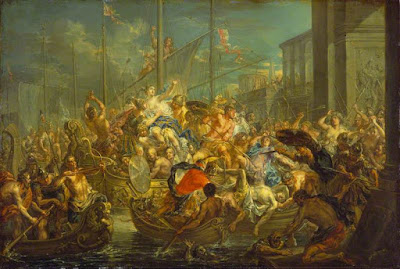 |
| The Abduction of Helen (c.1740-60) Johann Georg Platzer source ArtUK |
Croesus of Lydia was the first man to subjugate the Hellenes and his rule passed to Kandaules. Now, Kandaules had a beautiful wife and he insisted on showing her, in all her nakedness, to his servant, Gyges, so he would confirm her loveliness. Gyges is appalled, but what can he do? He is told not to allow the queen to know that he has seen her naked, but she spies him slipping out the door and plots her revenge. Confronting Gyges, she says he must either slay Kandaules and become king, or die immediately. Gyges chooses the former, dedicating much silver as an offering to Delphi, and therefore is able to invade Smyrna and Miletus. Thus runs a list of Lydian rulers and their deeds.
| The Imprudence of Candaules (1830) William Etty source Wikipedia |
Croesus, the son of Alyattes, attacked the Ephesians, the first of the Hellenes to be assailed. He subdued city-state after city-state: the Lydians, Phrygians, Mysians, Carians, Ionians, Dorians, Aeolians, etc, etc. At the pinnacle of his wealth, a man named Solon arrived in Sardis with many wise men of Hellas. He had effected laws for the Athenians at their invitation, then travelled for the ten years the laws were in place so as not to be convinced to repeal any of them. Croesus was curious as to who was the happiest and most prosperous man in the world, expecting the answer to be him, but Solon frustrated his expectations by naming two others. When Croesus challenged his answers, he replied that to be considered for this title, it must be judged how a man ends his life; until then he can only be called “lucky”. Croesus disparaged Solon’s wisdom and was sent a dream that his son, Aryes, would die by an iron spear. He, with hesitation, allows his son to go on a boar hunt, commissioning Adastos, a slave who he had rescued, to ensure his safety. Ironically, Adastos accidentally kills Aryes with his spear throw and though Croesus pardons Adastos, the slave kills himself on the tomb of Aryes.
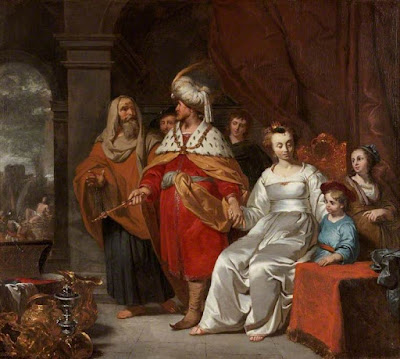 |
| Croesus Showing Solon His Riches (1655) Casper Casteleyn source ArtUK |
Herodotus relates more stories about Croesus and his ancestors, then returns to the worry of Persia and their possible aggression. Croesus sends a delegation to Delphi where the god, Apollo, returns his answer, advising him to ally himself with Sparta, and Croesus understands this to mean victory. Finally, he and his Lydian army meet the Persians, led by Cyrus, at Sardis, but the Persians are victorious and Croesus is taken prisoner. On his pyre, when Croesus recounts the words of Solon, Cyrus has a change of heart and commands his release, but the fire is already raging and only an unexpected storm of rain in answer to Croesus’ prayer to Apollo saves him. Now friends with Cyrus, Croesus instructs him how to stop the plundering of his city and therefore rescue his army from corruption, then requests the right to question the oracle on his mistaken prophecies, yet he learns that he is the one who had misunderstood and accepts blame.
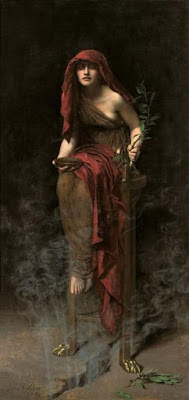 |
| Priestess of Delphi (1891) John Collier source Wikiart |
Thus runs more Lydian history and moves to the birth of Cyrus, whose grandfather plotted his death at his birth because of dreams he’d interpreted of Cyrus’ overthrow of him: Grandfather Astyages discovered that Harpagos, his servant, disobeyed his orders to kill the boy (instead giving him to a herdsman to kill who ended up raising him as his own) under the guise of friendship he gets Harpagos to send him his son, and then serves his son for dinner to the father. Harpagos unknowingly eats his son, and then all is revealed when Astyages has the son’s head, hands and feet brought in. This was not a good decision, for, when the wisemen or Magi reveal to Astyages that Cyrus is no longer a problem to his rule and his grandfather allows Cyrus to live in Persia, Harpagos stirs up dissent among the populous who already dislike Astyages’ cruel reign. The servant contacts Cyrus in Persia and Cyrus raises an army, who defeat the Medes who were not dedicated to fight for their despised leader. This is how Cyrus became king and later deposed Croesus to rule all of Asia.
 |
| King Astyages of Media Orders Harpagos to Kill Young Cyrus (late 18th century) Jean Charles Nicaise Perrin source Wikimedia Commons |
Herodotus now launches into a monologue of the customs of the Persians. Fascinating to learn that the Persians will not vomit or urinate in front of anyone. Good to know. Our sensibilities are all safe. Fortunately, although they will make business decisions while drunk, they will reconsider the decisions the next day when they’re sober. Strangely though, the decisions they make when they are sober, they will also evaluate while they are drunk.
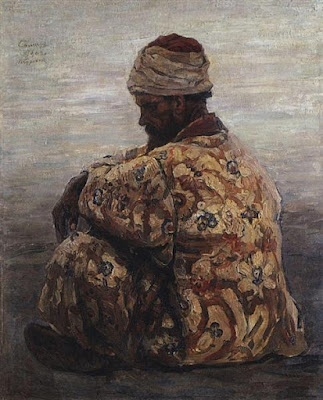 |
| The Persian (1902) Vasily Surikov source Wikiart |
Then we swing back to Cyrus: after he conquered the Lydians, the Ionians and Aeolians sent messages asking to be subject to his rule, but since they did not band with him is his battle with Lydia, Cyrus refuses. Then follows a history of the Ionians, Dorians, etc. It appears that although these areas are located on the coastline of Asia Minor, the peoples migrated from the Greek city-states, and in fact, Athens is considered an Ionian city although it does not like to be referred to as such. Halicarnassus, the birthplace of Herodotus (although he does not mention that fact) used to be the sixth Dorian city but now there are only five.
Cyrus not only conquers the Lydians, but conquers all the Ionian coast and we are given more history of the surrounding area. Next, Cyrus plans to advance on Assyria, and its city of Bablyon is described, including two queens that ruled it, Semiramis and Nitokris. Nitokris is particularly interesting as she made many clever improvements in infrastructure. She built her tomb in “mid-air” above one of the city gates, saying that if ever a future king was in need of money, he need only open her tomb, but warned that it should only be opened in dire need. No king dared disturb the tomb until Darius came to power, but instead of money he found a note:
“You would not open up the grave of the dead if you were not so insatiable and shamefully greedy.”
Back to Cyrus who went to war against the son of Nitokris, but before he reached Babylon, he was offended by the River Gyndes that swallowed one of his horses (yes, that’s right, a river) and he spent the whole summer dividing his army in work to destroy it, dividing the river into 360 channels. Rather childish of him but I suppose he was quite enraged. Then in spring he marched on Babylon. He defeated the Babylonian army outside of the city, but many men returned to the city with great stockpiles of food, and Cyrus found himself at an impass. However, with great guile, he diverted the Euphrates where it entered Babylon, and attacked by the riverbed, taking the inhabitants by surprise and conquering the city. Herodotus now describes the Babylonian crops and their enormous yields, their boats, their shoes, and their means of marrying off their daughters in an auction for money but if the couple cannot get along, the money is repaid and supposedly the girl returned. Sadly however, since the Persian capture, the Babylonians are impoverished and prostitute their daughters. A fascinating custom is that instead of doctors, they carry the sick person to the square and allow others to advise him, very helpful if someone else has had the same sickness and knows of a cure. Herodotus says that their most disgusting custom is that once per year every woman must sit in the sanctuary of Aphrodite and have intercourse with a stranger.
 |
| Cyrus the Great’s Siege of Babylon (1819) John Martin source Wikimedia Commons |
Cyrus now turned his battle-filled eyes to Massagetai which at this time was ruled by a woman named Tomyris. Refusing his proposal of marriage, seeing it for what it was, she suggested that he return to rule his people and allow her to rule hers, but if he insisted on battle, either come into her territory or let her come onto his. The generals of Cyrus suggest that they allow Tomyris onto Persian territory but Croesus convinces Cyrus otherwise. After having a dream that Darius is plotting his overthrow (which is really an omen of his death), the two sides battle and eventually Cyrus is killed. Tomyris defiles the corpse by placing his head in a wineskin filled with blood.
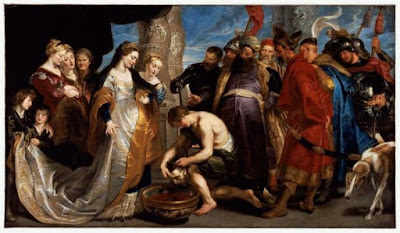 |
| Head of Cyrus Brought to Queen Tomyris (1622-23) Peter Paul Ruebens source Wikiart |

